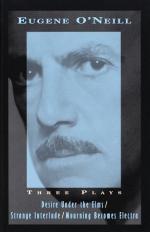|
This section contains 5,199 words (approx. 18 pages at 300 words per page) |

|
SOURCE: "The Longing For Death in O'Neill's 'Strange Interlude' and 'Mourning Becomes Electra'," in Literature and Psychology, Vol. XXXI, No. 1, 1981, pp. 39-48.
In the following essay, Feldman illuminates the influence of Sigmund Freud's concept of the death instinct on Eugene O'Neill's plays Strange Interlude and Mourning Becomes Electra, but acknowledges that O'Neill's characters seek death as an escape from the pain of living. rather than as an instinctual urge.
The longing for death is a theme which appears in many of the plays of Eugene O'Neill.1 Strange Interlude and Mourning Becomes Electra, which represent the middle period of O'Neill's career wherein the playwright was preoccupied with ideas, are two lengthy plays that repeatedly give expression to this theme. Generally speaking, the literary critics have regarded these two plays as heavily influenced by the psychology of Sigmund Freud. However, their analyses primarily have focused upon the subject of the...
|
This section contains 5,199 words (approx. 18 pages at 300 words per page) |

|


